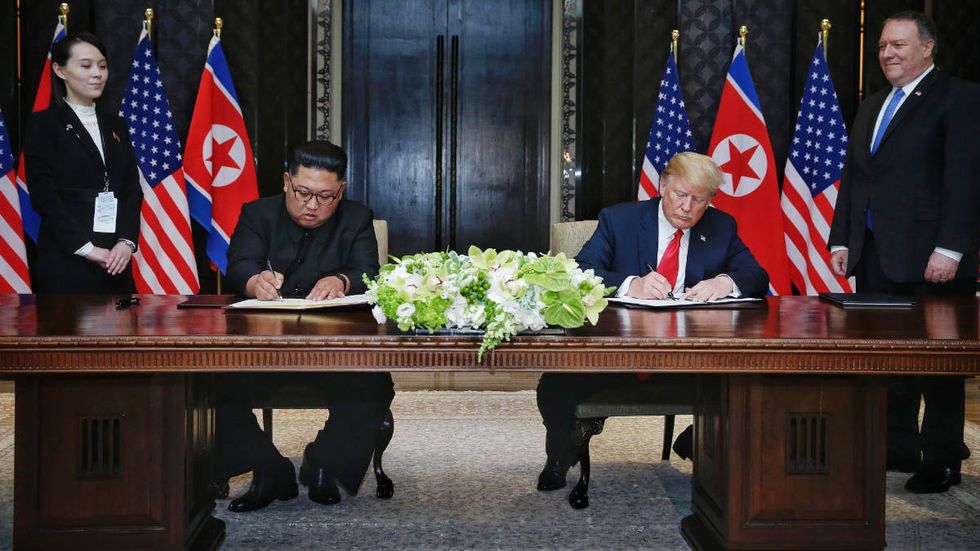
© 2025 Blaze Media LLC. All rights reserved.
Regardless of whether the Trump-Kim summit succeeds or fails, President Trump was right to try the diplomatic route in an attempt to end North Korea’s nuclear hostility. Diplomacy is not just reserved for allies, but for hostile adversaries, too. As commander in chief, the president must explore all avenues for securing the safety of the American people, who are currently threatened by the prospect of a nuclear-capable Pyongyang that may have the ability to strike the United States.
The North Korean nuclear threat can no longer simply be ignored. The Clinton, Bush, and Obama administrations kicked the can down the road for decades, and the road has come to an end. The “aid packages” and payoffs to the regime only encouraged Pyongyang’s rogue behavior and constant saber-rattling. Ignoring the threat only bought the Kim regime time to build up to the point where North Korea now has intercontinental ballistic missiles that may put the continental U.S. within range.
Many pundits have taken to social media and castigated the president for the act of meeting with Kim Jong Un. There is no question that Kim is a ruthless dictator who has been directly involved in the killings of countless innocents. However, moral posturing comes second to protecting the American homeland. There is no question that Kim Jong Un is the chief military commander of a nuclear-armed state. Whether we like it or not, Kim can no longer simply be ignored or disregarded. There are no signs that there is a quick fix to the human rights catastrophe that is North Korea. As the 21st century of American conflicts has shown elsewhere, it’s always a dangerous endeavor to attempt to manipulate a foreign country’s internal politics in an effort to bring a chosen political system to an adversarial nation, especially when it comes to Pyongyang’s longtime Stalinist regime. However, the United States can and should attempt to mitigate the threat that it poses, and diplomatic engagement is one tool in the American arsenal of statecraft.
There’s also a major strategic reason for meeting with Kim Jong Un and his delegation of top North Korean officials. As Sun Tzu, the legendary Chinese military strategist, explained in “The Art of War”:
If you know the enemy and know yourself, you need not fear the result of a hundred battles. If you know yourself but not the enemy, for every victory gained you will also suffer a defeat. If you know neither the enemy nor yourself, you will succumb in every battle.
The American intelligence community still knows very little about Kim’s intentions. The United States has virtually no access — even through intermediaries — to the closed-off hermit kingdom, which makes producing an accurate threat assessment a very difficult prospect. Meeting with Kim gave the Trump administration the ability to “know the enemy.”
As analysts from across the globe weigh in and take up their respective partisan positions, it’s important to remember that many are simply jumping the gun in labeling the Singapore summit a success or a failure. Kim Jong Un has yet to commit to verifiable action. Anyone making bold proclamations about imminent peace or total failure should be wholly disregarded.
The United States did not give up anything to take part in the Singapore summit. In fact, we still have plenty of leverage against North Korea. The Singapore meeting changes nothing on that front. The Trump administration’s “maximum pressure” against Pyongyang appears to be continuing and working. Many analysts have credit the isolation and pressure strategy as one of the main reasons that Kim Jong Un decided to come to Singapore.
It’s far too early to tell if the Singapore summit will result in a successful outcome for U.S. interests. However, the White House can ensure that there are no setbacks to U.S. national security by staying true to the administration’s North Korea strategy. By all accounts, the Trump administration remains committed to verifiable denuclearization first, before making concessions to the Kim regime. By staying true to the overall strategy, there is very little that can be lost — from a strategic and security perspective — in the wake of the Singapore summit.
#mc_embed_signup{background:#fff; clear:left; font:14px; }
/* Add your own MailChimp form style overrides in your site stylesheet or in this style block.
We recommend moving this block and the preceding CSS link to the HEAD of your HTML file. */
Want to leave a tip?
We answer to you. Help keep our content free of advertisers and big tech censorship by leaving a tip today.
Want to join the conversation?
Already a subscriber?
more stories
Sign up for the Blaze newsletter
By signing up, you agree to our Privacy Policy and Terms of Use, and agree to receive content that may sometimes include advertisements. You may opt out at any time.
Related Content
© 2025 Blaze Media LLC. All rights reserved.
Get the stories that matter most delivered directly to your inbox.
By signing up, you agree to our Privacy Policy and Terms of Use, and agree to receive content that may sometimes include advertisements. You may opt out at any time.





